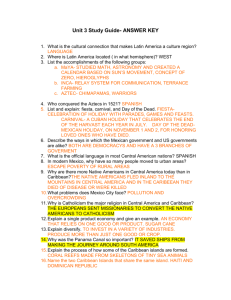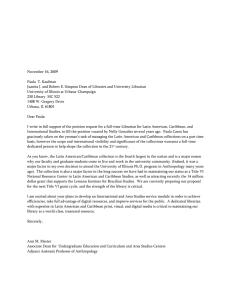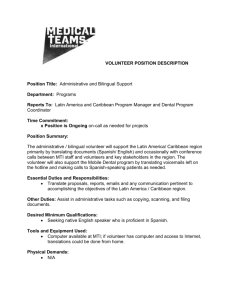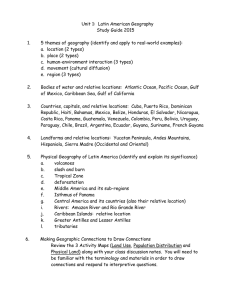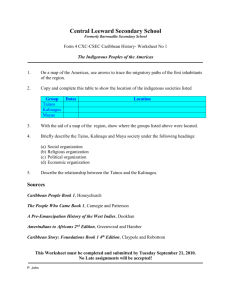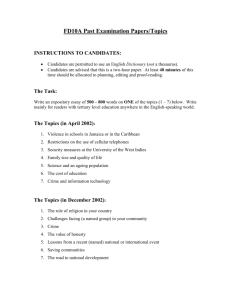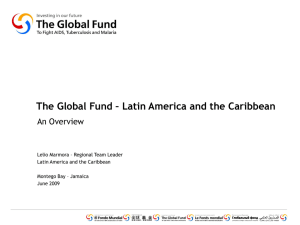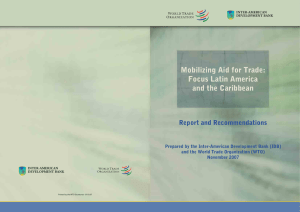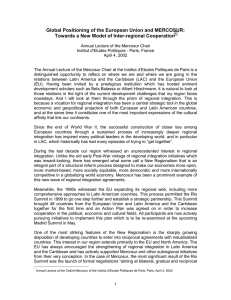INTER-AMERICAN DEVELOPMENT BANK Department of Integration and Regional Programs
advertisement
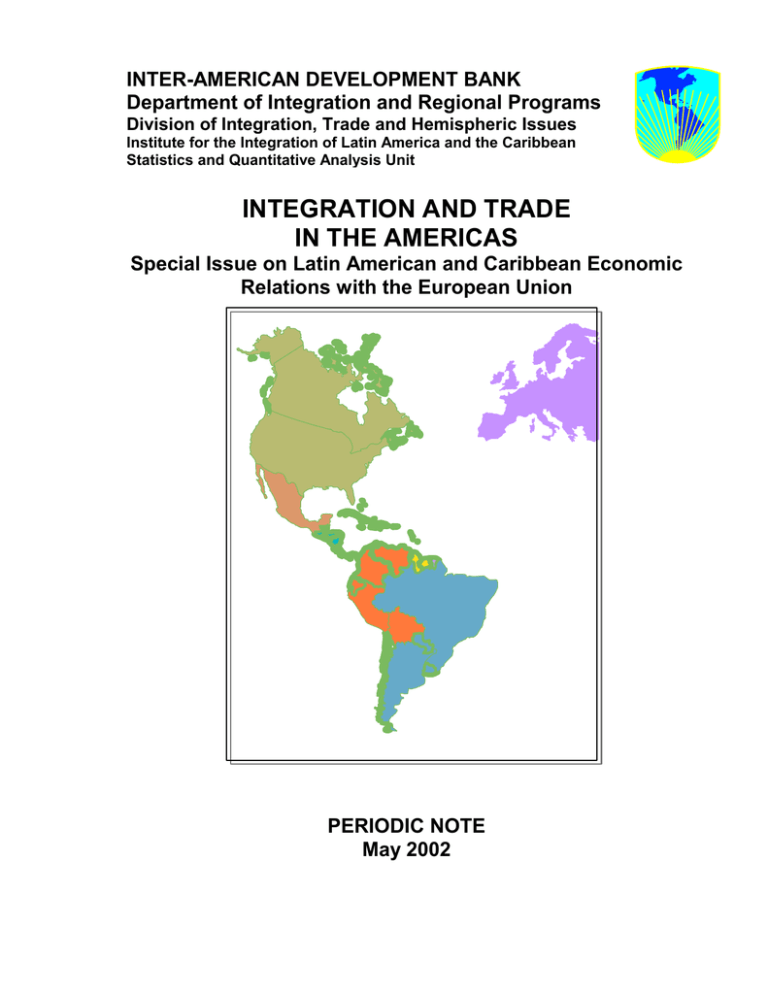
INTER-AMERICAN DEVELOPMENT BANK Department of Integration and Regional Programs Division of Integration, Trade and Hemispheric Issues Institute for the Integration of Latin America and the Caribbean Statistics and Quantitative Analysis Unit INTEGRATION AND TRADE IN THE AMERICAS Special Issue on Latin American and Caribbean Economic Relations with the European Union PERIODIC NOTE May 2002 INTEGRATION AND TRADE IN THE AMERICAS Periodic Note Integration and Regional Programs Department Nohra Rey de Marulanda Robert Devlin Peter Kalil Juan José Taccone Michael McPeak Manager Deputy Manager Chief, Integration, Trade and Hemispheric Issues Division Director, Institute for the Integration of Latin America and the Caribbean Chief, Statistics and Quantitative Analysis Unit The purpose of this document is to inform Bank staff and other interested parties about recent developments in integration and trade among the countries of the Western Hemisphere and between these and other countries and world regions. This Periodic Note was prepared by Andrew Crawley, Anneke Jessen, Andrew Katona and Mark Reedy of the Integration, Trade and Hemispheric Issues Division (INT/ITD); Matthew Shearer of the Statistics and Quantitative Analysis Unit (INT/STA); and María de la Paz Covarrubias of the Deputy Manager’s Office, of the Integration and Regional Programs Department. Nohra Rey de Marulanda and Robert Devlin were responsible for the overall supervision of the document. The opinions expressed herein are those of the authors and do not necessarily reflect the official position of the Bank or its member countries. Note: The map displayed on the cover is included for illustrative purposes only. It does not constitute an official representation of the area covered. Abbreviations AC ACP BBVA BNC BSCH CACM CAP CARICOM CARIFORUM CBI CEECs CFSP CIF EC ECHO ECIP ECLAC EIB ESC EU FCES FDI FTAA GDP GSP HS IDB IMF IRELA LAC MEBF MERCOSUR NAFTA NGOs ODA RCA REPA RNM SEA SMEs TNCs UNCTAD WTO YPF Andean Community African, Caribbean and Pacific Banco Bilbao Vizcaya Argentaria Biregional Negotiations Committee Banco Santander Central Hispano Central American Common Market Common Agricultural Policy Caribbean Community Caribbean Forum of ACP countries Caribbean Basin Initiative Central and East European countries Common foreign and security policy Caribbean Investment Fund European Community European Community Humanitarian Office European Community Investment Partners Economic Commission for Latin America and the Caribbean European Investment Bank Economic and Social Committee European Union Foro Consultivo Económico y Social / Economic and Social Consultative Forum Foreign Direct Investment Free Trade Area of the Americas Gross Domestic Product Generalized System of Preferences Harmonized System Inter-American Development Bank International Monetary Fund Institute for European-Latin American Relations Latin America and the Caribbean Mercosur-EU Business Forum Southern Common Market North American Free Trade Agreement non-governmental organizations Official Development Assistance Revealed Comparative Advantage Regional Economic Partnership Agreement Regional Negotiating Machinery Single European Act small and medium-sized enterprises Transnational Companies United Nations Conference on Trade and Development World Trade Organization Yacimientos Petrolíferos Fiscales TABLE OF CONTENTS I. SETTING A CONTEXT: AN OVERVIEW OF EU-LAC RELATIONS ............................ 1 The First Steps to Inter-regionalism ............................................................................................ 1 Dialogue and Cooperation: The Expanding Agenda of the 1990s............................................... 3 The Commercial Dimension........................................................................................................ 5 II. EU-LAC TRADE 1991-2000: A DECADE OF CHANGE.................................................... 7 EU-LAC Trade at the Aggregate Level ....................................................................................... 8 LAC Trade with the EU at the National and Subregional Levels.............................................. 17 Summing up............................................................................................................................... 19 III. EUROPEAN DIRECT INVESTMENT IN LATIN AMERICA AND THE CARIBBEAN ...................................................................................................... 21 Geographical Distribution.......................................................................................................... 23 The Special Case of Spain ......................................................................................................... 24 Sectoral Trends .......................................................................................................................... 25 Prospects for European FDI Flows to LAC............................................................................... 26 IV. POLICY INSTRUMENTS TO PROMOTE INTER-REGIONAL TRADE AND INVESTMENT RELATIONS .................................................................................... 28 Traditional Policy Instruments: Promoting LAC Exports to the EU ............................................. 28 Economic Cooperation Instruments: From First to Third Generation........................................... 31 New Policy Instruments: From Fourth Generation to Commercial Reciprocity ........................... 36 The EU-Mexico Free Trade Agreement ........................................................................................ 41 Negotiations with Mercosur and Chile .......................................................................................... 42 The New EU-ACP Partnership Agreement and Future EU-Caricom Trade Negotiations ............ 44 V. TRENDS IN EUROPEAN DEVELOPMENT ASSISTANCE FOR LATIN AMERICA AND THE CARIBBEAN.................................................................................. 47 EU-LAC Cooperation in the Global Context................................................................................. 47 EU Donors in LAC: Trends in ODA Outflows ............................................................................. 48 Geographical Distribution of European ODA in LAC .................................................................. 51 Sectoral Composition of European Assistance in Latin America.................................................. 53 ANNEX I. LAC-CEEC COMPETITION IN THE EU MARKET ......................................... 57 ANNEX II. NATIONAL AND SUBREGIONAL TRENDS IN LAC TRADE WITH THE EU ....................................................................................................... 70 ANNEX III. STATISTICAL OVERVIEW ............................................................................... 84
